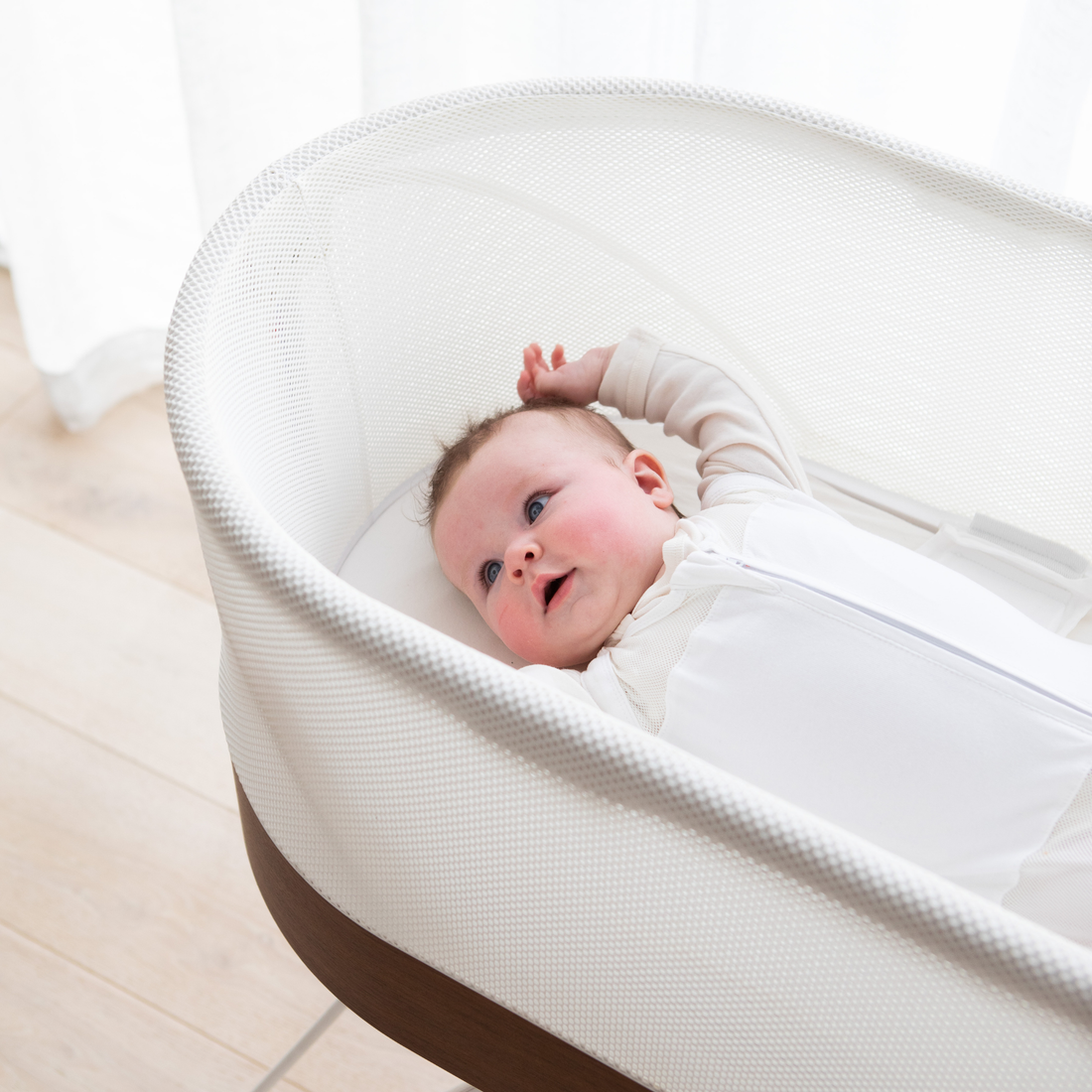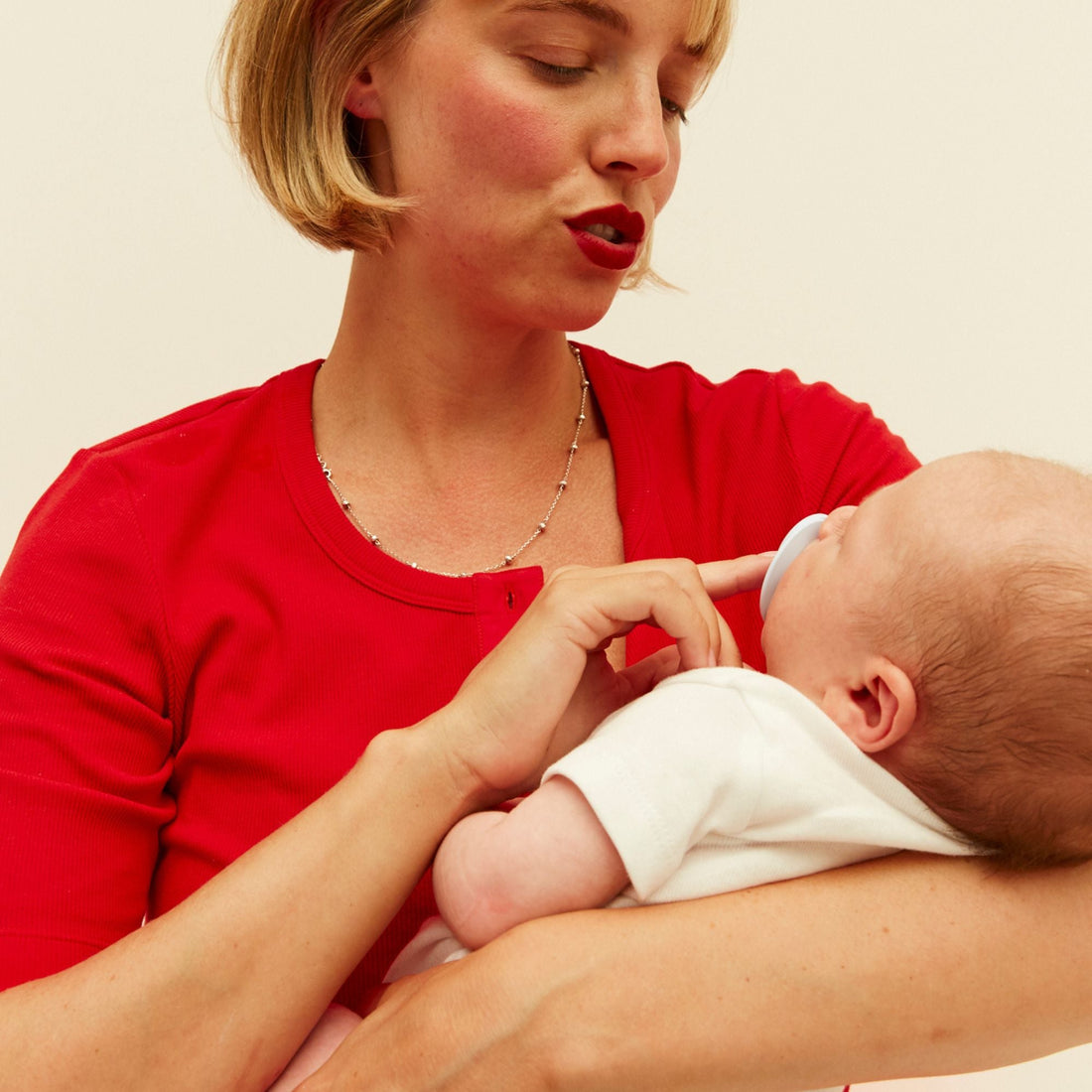Plus, the difference between pink and brown noise.
Most people are prepared for the first few weeks or even months of sleep being tough with a new baby, but when sleep is still elusive when they’re six months or more, and you’re running on empty, you need some assistance. A good routine helps a lot, so does blackout blinds, and a calming sleep space, but new parents will be recommended white noise again and again. In an older, landmark study of 40 newborns, it was demonstrated that 80% of babies fell asleep to the sound of white noise within five minutes. A newer, Nanit Lab study on the power of white noise, found it may also increase sleep duration, as studied babies sleep an average of two extra hours per night with white noise. Baby monitors play it, there are specific white noise machines and white noise playlists are aplenty on Spotify, but now there’s also pink noise and brown noise popping up as our savers of sleep. To find out which is the right one for your baby, how to use it and why exactly it works, we spoke to Dr. Daniel Golshevsky (Dr. Golly), paediatrician and creator of the Dr. Golly Sleep Program.
Why does white noise help soothe babies?
“If we consider the concept of the 4th trimester; this helps us to understand where the most effective settling techniques are derived,” says Dr. Golly. “Different measures like swaddling, shushing, patting, rocking a newborn, essentially return us to the feeling of being in the womb and are extremely effective. If you think about what a baby is hearing when in the womb, it’s similar to listening to things when underwater. This is the theory behind white noise as a settling technique. As your baby grows, it remains a positive association, helps your baby link their sleep cycles and drowns out external and household noises.”
What white noises should we be using?
“True white noise is that static sound, but many white noise machines also play nature sounds such as rain and ocean sounds. Either option, white noise or nature sounds, are fine to use. What is important is that it be played at a medium level (around the volume level of a shower running) and when your baby is crying, it can be turned up so they can hear it over their cries, then turned down when calm and settled. It should be played for every sleep, for the entire duration of sleep, even overnight, and it’s amazing how many parents tell me they now love white noise too and their own sleep has benefited.”
Have you missed the boat if you didn’t start using white noise from day one?
“It’s never too late, however if your baby is over one-year-old then I recommend first considering some nature sounds as it is an easier transition from having no noise at all.”
When do you need to stop using white noise?
“I often get asked this, but it’s perfectly safe to continue to use white noise throughout childhood and adolescence. If you do want to start weaning your toddler or child off, then simply turn it down, bit by bit, every night until they no longer need it.”
What’s the difference between white and pink noise?
“More recently, research has popped up regarding different forms of white noise, including pink, brown and black. By definition, “white noise” covers all audible frequencies of sound. Within that category, pink noise is deeper, like having a bass rumble. Rain or a heartbeat are examples of pink noise, with a deeper feel to it. Brown noise moves deeper still, like the sound of a waterfall continually crashing, or a deep rumbling of thunder. Black noise is the exact opposite, an absence of sound, like one would hear in outer space. Some adults prefer absolute silence to sleep, but babies often find this quite disconcerting. Of all the background noise colours and frequencies, only white noise has scientific data that supports it.”
-v1743044140475.png?2000x2000)
Meet Dr Golly
Dr Daniel Golshevsky (Dr Golly) is Australia’s Favourite Paediatrician and father of 3.
With a growing social and media presence, he is a proud Red Nose Australia Ambassador & clinical champion of perinatal mental health for both the Gidget Foundation & PANDA.
As a general paediatrician, he cares for babies, children and teenagers of all ages, managing physical, mental and behavioural development as well as illness and emergency.
Over the last decade, Dr Golly sub-specialised in unsettled babies and poor sleep. His philosophy is centred around empowering parents & protecting mothers. He developed an online Sleep and Settling Program, which has quickly become the essential guide for thousands of families across the globe.
He is the author of Your Baby Doesn't Come With a Book and children's books Our Baby, Our Baby What Do You Need? and Our Baby Our Baby What Did You Say?.
































